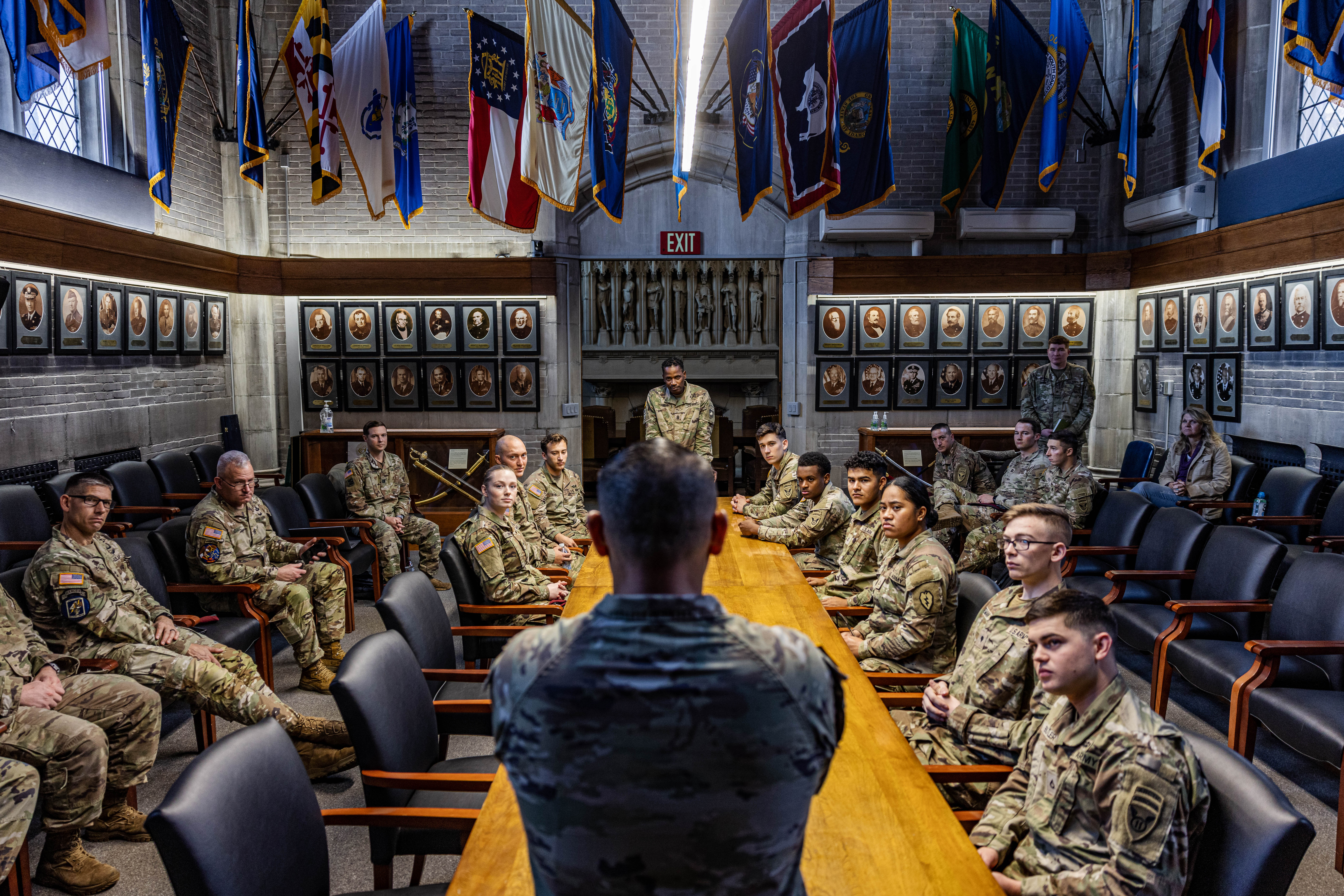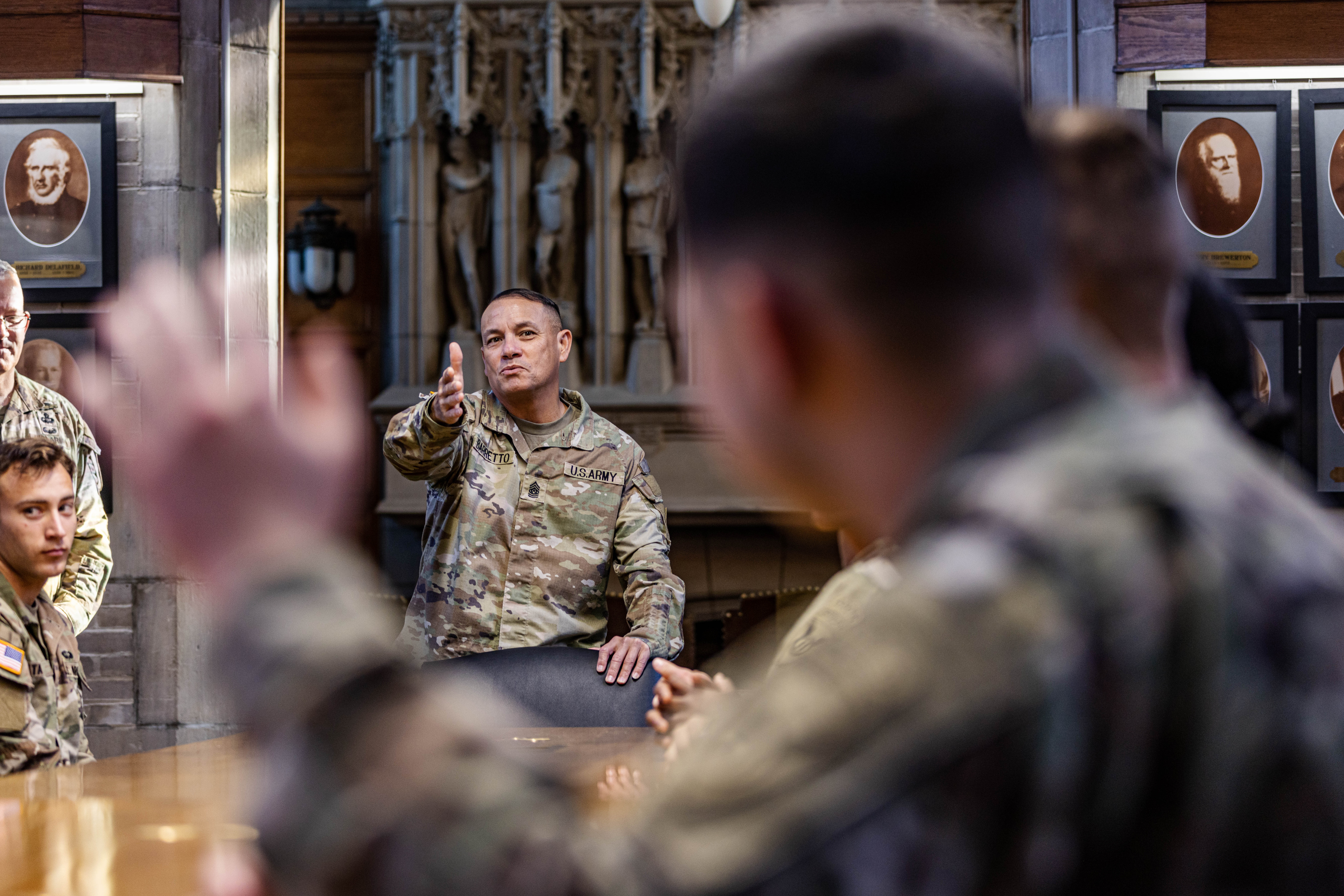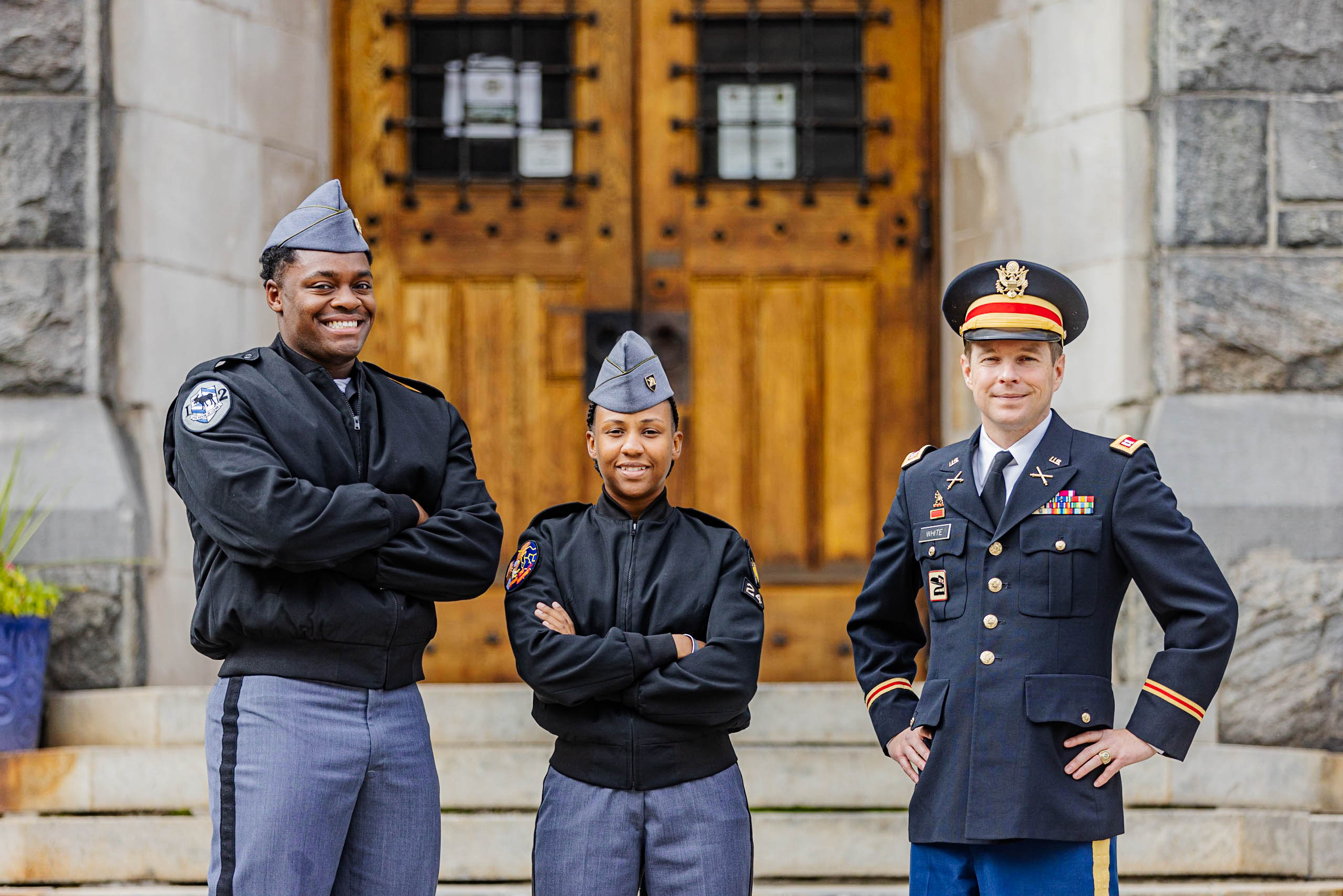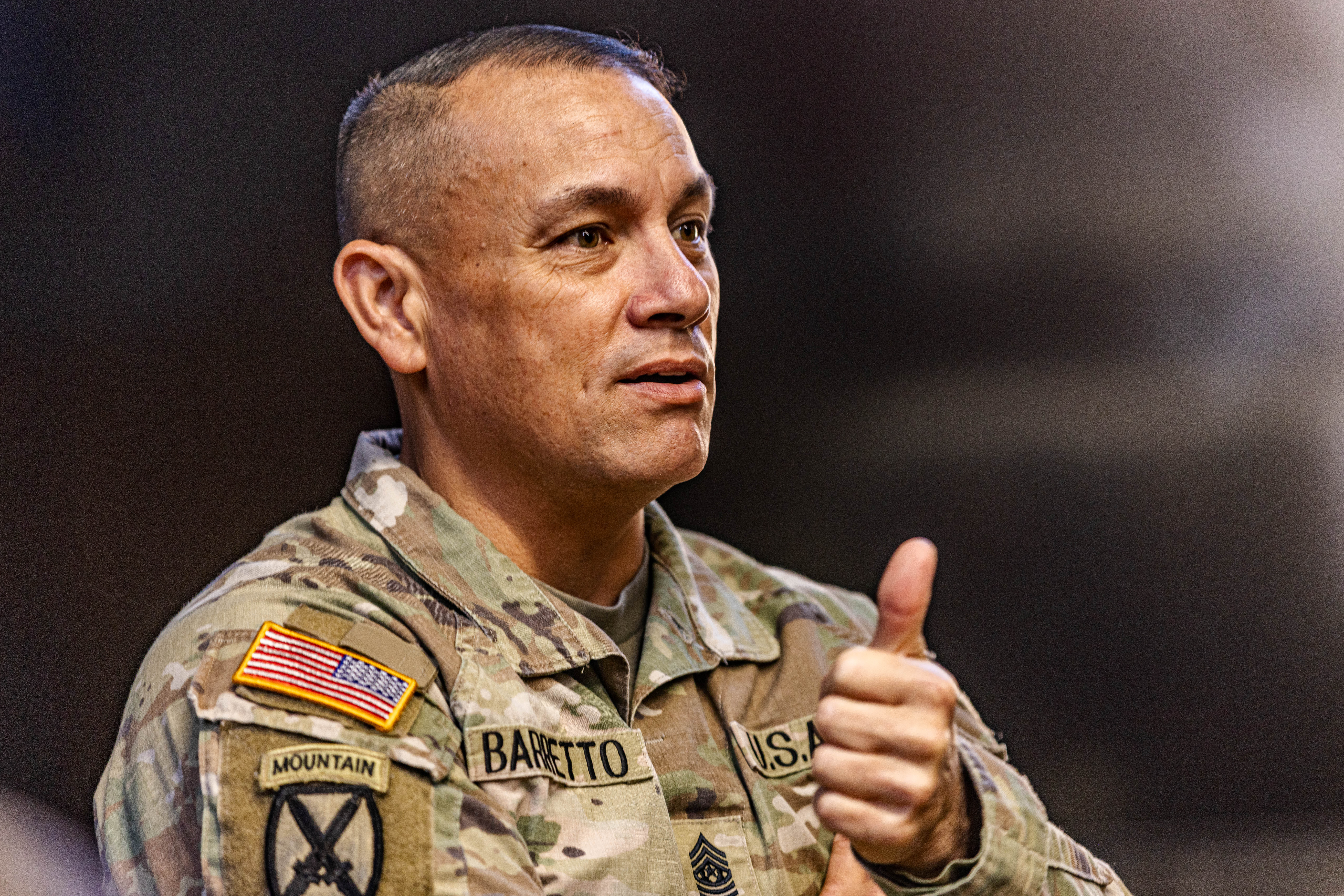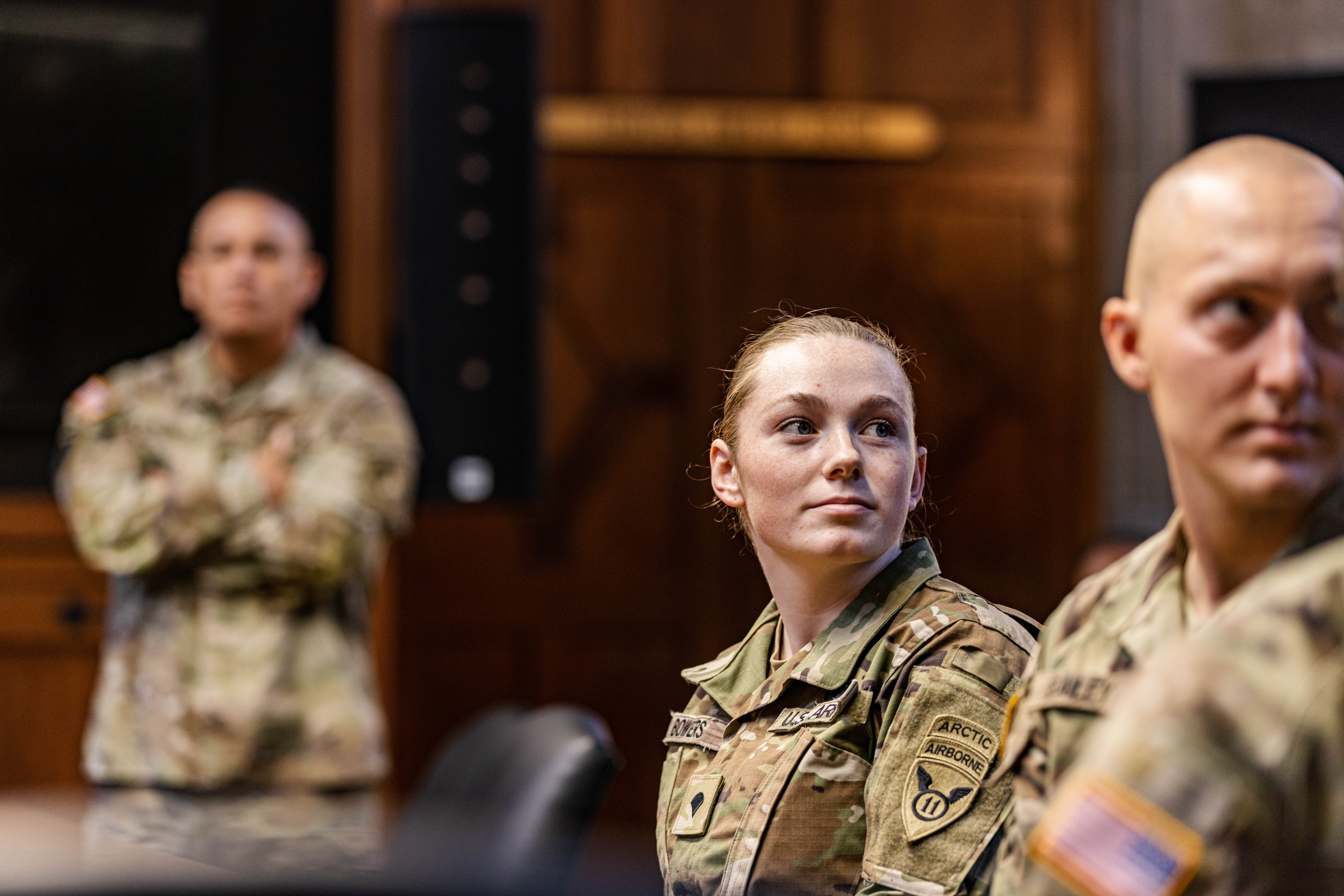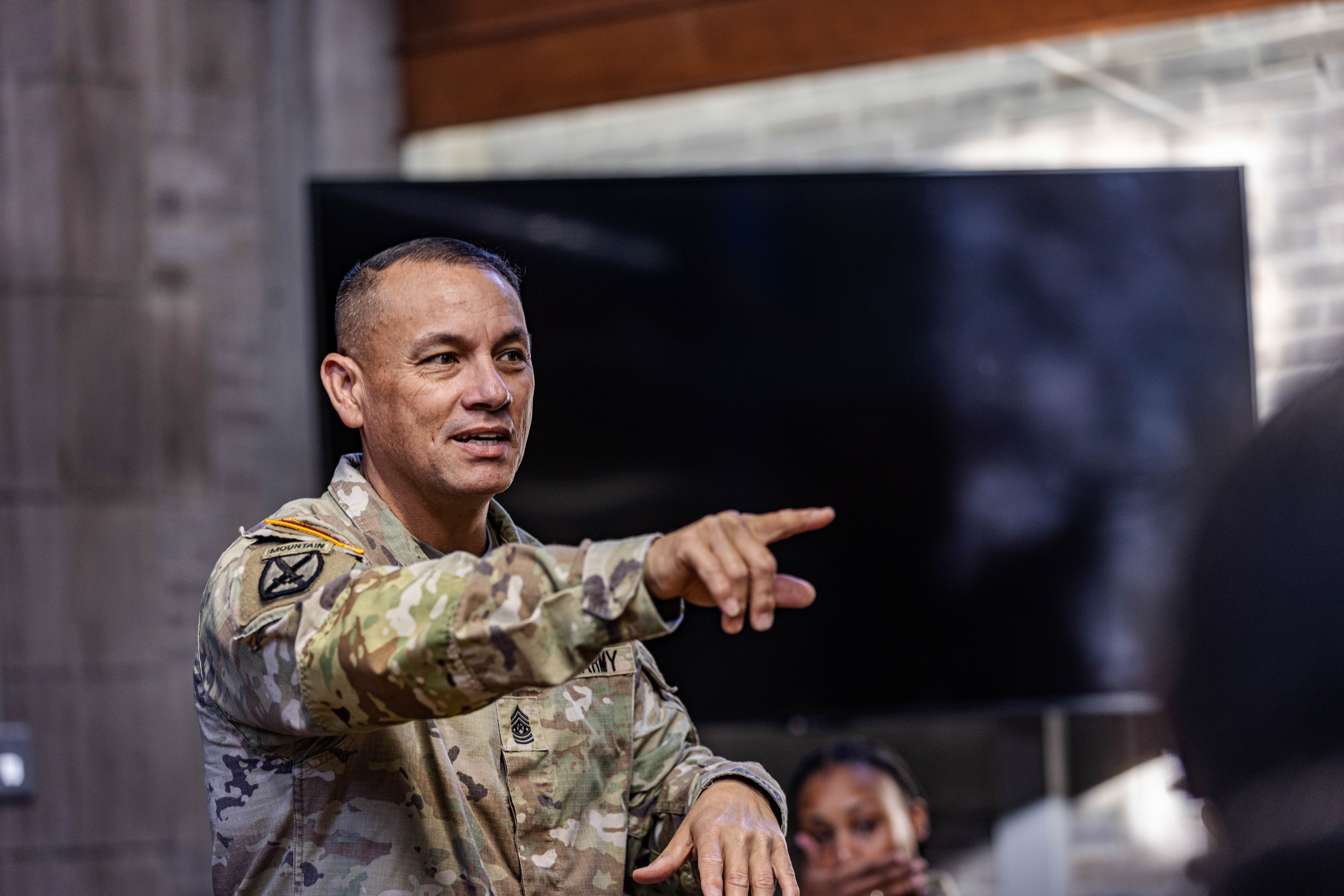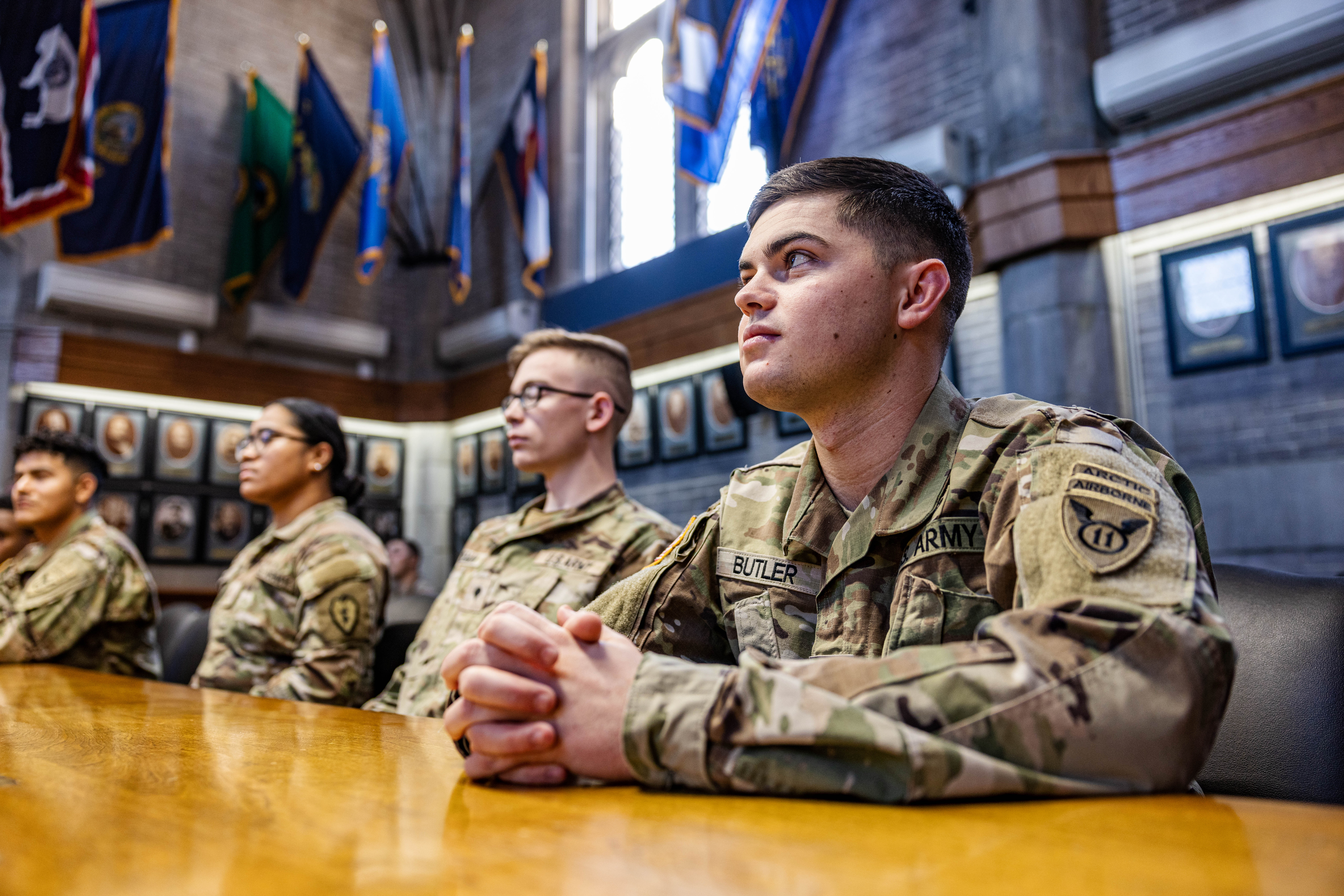Junior Soldiers, cadets and senior leaders gathered at the Superintendent's Conference Room to discuss the significant transition from being an enlisted Soldier to following the path of officership as part of the Soldier's Admission Program (SAP) on Oct. 13 at the U.S. Military Academy.
Command Sgt. Maj. Phil Barretto, the USMA command sergeant major, engaged in discussion with nine Soldiers from the 11th Airborne Division about enrolling at West Point and the plethora of opportunities that come with the 47-month experience.
Barretto explained that through SAP, Soldiers who are selected receive a fully funded four-year education valued at $250,000. Within four years, they will graduate and commission as second lieutenants in the Army with a Bachelor of Science degree.
"Who's on the fence?" Barretto asked.
A few Soldiers raised their hands, uncertain of what decision to make. The Soldiers voiced concerns about returning to an educational institution after a hiatus from the academic realm, while serving the country and navigating uncharted territory at the academy.
However, Barretto responded by informing the Soldiers that they should not view West Point as a traditional academic institution. Fundamentally, West Point and the Corps of Cadets leadership system is based primarily on how the Army is structured.
For example, the Army is defined by its battalions, companies, platoons and squads.
Correspondingly, the Corps of Cadets is composed of 36 companies that form the entire brigade. Each company holds 120-130 cadets who are consolidated into platoons and squads.
Additionally, the academic support system differs drastically compared to most universities, according to Barretto.
"We don't consider ourselves a college or university because we're more than that. We're the United States Military Academy," Barretto said. "I can tell you firsthand, no one that's on faculty has their phone off. I'll challenge you guys to go to a university or college and see if your professor answers the phone at 2 a.m. in the morning.
" ... My teammates don't have office hours," he added. "No matter what you have – you're struggling with the paper? You call them, they will answer. That's mandatory across the entire institution."
Barretto emphasized that the academy actively seeks candidates with an enlisted background, reserving 170 slots each year for prospective candidates. Moreover, he advised Soldiers to seek mentors who will encourage them to complete their packet and avoid mind traps that result in self-sabotage.
"You need to understand that sometimes you are the very barrier that stands in the way of what you want to achieve," Barretto said. "Don't give up your slot ... the top leadership of the 11th Airborne Division sees something in you guys and that's why they brought you here with them."
After discussions, the Soldiers seemed enthusiastic about West Point and the opportunity that awaits them, presuming they complete their packet. While touring the gothic structures of the academy, the Soldiers were immersed in the storied history of West Point and learned about distinguished USMA graduates turned influential leaders and industry moguls who helped shape the nation.
Renowned graduates such as George Patton, Edwin "Buzz" Aldrin, Nadja West and Mike "Coach K" Krzyzewski are among the many trailblazers who have impacted war strategy, space exploration, the medical field, and leadership through sports.
Pfc. Mike Godinez shared his enthusiasm for the academy’s history and his goal of one day roaming its hallowed halls. With the support of prior service cadets, he is working toward that dream by preparing for the Scholastic Aptitude Test.
"No other college with an ROTC program has done that for me," Godinez said. " ... Becoming an officer was something I always planned on doing since I joined the Army and I was making preparations to achieve that goal through ROTC, but I now feel that reaching that goal through West Point is the best way to do it."
Hailing from American Samoa, Pfc. Williza Anetipa has served the Army for one year as a unit supply specialist. However, her unique circumstances were brought up during discussions, which posed a thought-provoking question: how do foreign nationals apply to West Point?
Capt. William White, the Soldier Regional Commander for West Point Admissions, stated that at the moment, "She simply does not meet the requirements to attend USMA because she is not a U.S. citizen. Because she is a Soldier, the process can be expedited in some respects with paperwork.
"When she brought it up at the meeting that her brigade commander was looking at it still, (it is) likely that packet had only been on his desk for about a week," White added. "So, she is on track, and we are moving her file along. She just needs to become a citizen prior to her attending USMA. If she goes to USMAPs first, then she has an extra year to get it sorted ... "
Anetipa is currently applying for naturalization (U.S. citizenship) and believes that the SAP discussion and the assistance she is receiving from the 11th Airborne Division have provided her the support she needs to pursue her goal of enrolling at West Point.
"First of all, it was a great opportunity. I very much enjoyed it, and I am grateful, beyond grateful, because not everyone gets this opportunity. We only had less than 10 Soldiers here participating in this discussion and I am grateful to be among those Soldiers," Anetipa said. "It is a huge moment for me, not only for myself, but for my people – the U.S. nationals in general and also, for everyone who wants to become an Army officer.
"Sitting with these ranking officers and enlisted service members makes me appreciate this moment that much more," she added. " ... Because I know that I will get the help that I need regardless of whatever setbacks occur or however long it takes."
As discussions with Barretto concluded, Pfc. Trevor Taylor, who traveled here as part of the 11th Airborne soldier admissions tour, was called by White to stand before his peers to receive a Letter of Assurance, a conditional appointment offered by admissions.
"For me, it answers any questions I might have had about whether I'm making the right choice about what kind of leader I want to be," Taylor said. "I now know, for sure, that I want to take full advantage of coming here and making myself a better leader.
"If you like what you do in the Army and want to be in for the long run as a leader, there's no question that you should become an officer, and the best route to becoming an officer is through West Point," Taylor said.
Prior Service Cadets Pay It Forward, Share Testimonials
Nested within the West Point Leadership Center and housed within the Department of Behavioral Sciences and Leadership, the Prior Service Forum (PSF) provides mentorship, sponsorship, leader engagement, and outreach support for incoming prior enlisted Soldiers.
While imparting his wisdom, Barretto turned to five prior service cadets, among them Class of 2024 Cadet Shari-Lee Bennett, who actively engaged in the discussion. As the assistant cadet in charge, she offered valuable insights about the significance of the PSF and shared her personal experience transitioning from Soldier to cadet, relating considerably to the challenges that Anetipa would face, transitioning from Jamaican to U.S. citizenship.
Bennett’s uncle, a dedicated police investigator in the Jamaican police force, significantly shaped her commitment to public service. The 9/11 tragedy also influenced her decision, inspiring her at a young age to one day don the Army uniform and defend the nation.
"I thought he was pretty cool at the job that he did. And so, that drove my desire to serve," Bennett said. “And then growing up, I was young when 9/11 happened. And I just remember my mom having a calendar that she never took down in the house and it was from 2001.
“She had circled that date and never moved the calendar. Even to this day, she still has it and at the time, we weren't even U.S. citizens, but my entire family was in United States so, growing up with that experience pushed me to serve. It was a calling to do more with my life.”
Despite Bennett’s passion to enlist, her parents did not want her to join the Army.
“ … My mom in particular, didn’t want me to join,” Bennett said. “She was like, ‘I want you to go to school.’”
Yet, when her recruiter explained to her mother that Bennett can enlist and receive tuition assistance from the Army, she relented, believing that her daughter was making the right choice for her future.
“She was for it because growing up in Jamaica, and having immigrant parents, their big thing is making sure that you put your education first in order to elevate your socio-economic status. And so, education is the key to success in my parent’s eyes,” Bennett said.
Bennett served for two years as a combat medic with the 101st Airborne Division, stationed at Fort Campbell, before securing a slot at USMAPS (U.S. Military Academy Preparatory School).
“I had opportunities to do as much medical training that I wanted to do and that was because I had amazing leadership,” Bennett said. “I had the type of leadership that if you (showed an) interest in doing something, they would facilitate the training to improve your skills (in that field) … my leadership never hindered anybody in our platoon from pursuing anything that they wanted to do.”
Upon Barretto's request during discussions, Bennett imparted some advice to the Soldiers to aid them in their decision-making process.
"West Point provides a great opportunity for leadership development. And so, if that's what these enlisted Soldiers are after, then this is the right place for that," Bennett said.
She added that Soldiers who wish to apply should not do it based on pressure from family or friends.
"Do it for the right reasons," Bennett said. "Do it because you want to be a great leader and you want to extract all the knowledge you can from the academy and the programs that it offers here in leadership and character development … ”
As a former enlisted Soldier, Class of 2025 Cadet Ronald Taylor, has also supported prior service cadets as the Prior Service Forum Cadet in Charge. With aspirations to join either the Federal Bureau of Investigation or the Central Intelligence Agency as an agent, Ronald believes the leadership skills he has amassed throughout his West Point experience will serve as a strong foundation to becoming an effective leader for his future Soldiers.
Before entering West Point, Ronald applied to the University of Pennsylvania and three other colleges. Penn State accepted him, however, coming from a single-parent household made it exceedingly difficult to secure funds needed to enroll.
“My mom didn't have the money to put me through college and I also didn't want to put her through that,” Ronald said. “At that time, I also realized I wasn't really ready for college. I wanted to take a break. And so, (my mom) suggested I enlisted in the Maryland Army National Guard.
“I was like, ‘I'm down with it,’ so she took me to a recruiter. I let them know that my end goal is either FBI or CIA. And so, with that knowledge, they suggested I become an all-source analyst — military intelligence.”
Ronald would spend three years with the 629th Expeditionary Military Intelligence Battalion, with a nine-month deployment to Afghanistan, building a plethora of skills.
During that time Ronald, looking to transition to active duty, saw the opportunity to enroll at West Point when his platoon sergeant advised that he should apply.
“ … One of my platoon leaders suggested I should apply to West Point because I’d be able to go active duty and then I also get a college degree which my mom really wanted me to get that education. So, I killed two birds with one stone,” Ronald said. “ … When my platoon sergeant mentioned West Point, I never really had that much knowledge about it.
“I didn’t know West Point was one of the top premier institutions … but then he told me that they allocated slots to enlisted Soldiers,” he added. “I put my application together and I saw the opportunity to pay it back to the people who supported me."
Ronald added that Soldiers should also build greater situational awareness and recognize when it is time to improve one's character and take complete advantage of a prosperous opportunity.
"If you see that you need improvements and you feel the Army will help you in that effort, become an officer," Ronald said. "Also, if you just feel stagnant as an enlisted Soldier or you just want better for yourself, in general, why not face the challenge in coming to West Point. I don't understand why anybody wouldn't want to better themselves. If the opportunity is there and the resources are there, why would you not want to take it?"
Do Not "Reject" Yourself, White's Words of Advice for Prospective Candidates
Watching the junior Soldiers come to terms with their decisions sparked a feeling of nostalgia for White, for he, too, understood the significance of transitioning from Soldier to officer through the West Point pipeline.
Back in 2006, recruiters from the California National Guard sought to recruit White before he graduated from high school.
"The recruiters came to talk to me about my options, explaining that in the National Guard, you can stay in your local area, you can go to a community college and 'we'll pay for the education, and we'll also give you a $20,000 bonus,'" White said. " ... Back then, it was a different time. The sense of duty, service to country and patriotism was different since we were heavily involved with Iraq and Afghanistan."
White answered the call to action, enlisting as a Cavalry Scout in the California National Guard.
"I liked the idea of joining a team and being a part of something bigger than myself, but also being able to keep my options open with respect to higher education," White said. "But, with that being said, I was not ready for that ... "
After White had returned from Military Occupational Specialty training at Fort Knox, Kentucky, he attended his local community college, and upon self-reflection after taking his courses, he made a compelling realization.
"I realized that no one was going to make me go to class or make me do my coursework," White said. " ... I stopped doing it -- I needed more structure, and that's pretty indicative of a lot of our enlisted Soldiers. In some way, our highest achieving Soldiers are the ones that thrive within structure, and I think I was the same way."
At the time, his unit was preparing to deploy to Iraq. With mounting tensions in the Middle East, White decided to stop attending college, ultimately forgoing the "College First" portion of his contract with the National Guard.
" ... While I could have opted to stay and continue going to my community college, I stopped going to class and decided to deploy with my unit to Iraq," White said.
During his sixth consecutive month of deployment, former Marine and retired Army Sgt. Maj. Louis Ponticas approached White, who was then a sergeant first class, and asked, "What do you plan on doing when you go back?"
White considered returning to community college developing an interest in joining the ROTC program.
"I said, 'officership is something I might have an interest in,'" White explained. "And then he said, 'you should apply to West Point.'"
Until this point, White had never heard of West Point and how it commissions nearly thousands of officers annually into the U.S. Army.
"He explained the whole thing to me, but I felt I couldn't get in – I wasn't smart enough, and I didn't have the grades to get in, I thought. Then, he explained the prep school (USMAPS)," White said. "He had no ties to the academy, other than he was smart and plugged in, because in his civilian job he was an executive at PayPal, and I think he worked with some (USMA graduates). He pulled me in and said, 'stop thinking about yourself in that way. How about you just apply and let them tell you, no.'"
Those words of encouragement were enough for White to make one of the most critical decisions of his life and to this day, he keeps in touch with Ponticas, using his pragmatic words of wisdom to inspire enlisted prospects who are unsure of their academic abilities.
White explained how more noncommissioned officers should emulate Ponticas's example and motivate their Soldiers in a similar way.
" ... The people that Soldiers deal with day-to-day are their team leaders, squad leaders and platoon sergeants, and those are the people who have the greatest impact on a Soldiers potential success," White concluded. " ... Don't self-reject or self-select out, because the worst someone can tell you 'no'. Finish the application and let me be the person to advise you on what you need to do to improve yourself."
